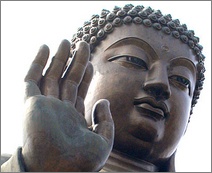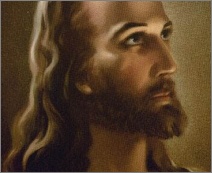Investigation of Jesus,
Muhammad, & Buddha
Their
Origins
by Jeb Beates, Writer
09.22.05 Many
great men have left their marks on history, many of them kings and princes, or
warriors and philosophers. But while kingdoms fall and new empires rise
throughout the centuries, only religious faith has overcome the test of time.
The sheer historical importance and influence of three particular men, Jesus
Christ of Nazareth, Muhammad, and Siddhartha, the first Buddha, is undeniable.
In our modern world, Christianity and Islam boast around 2 billion followers
each, while the followers of Buddhism number around one half billion. The
influence of Jesus, Muhammad, and Buddha on history is undeniable, but where
exactly do these men come from? The dogmatic differences presented by each man’s
message are great, but what all three men have given people is faith.
A man named Siddhartha Gautama, who became the first
Buddha, long before Jesus of Nazareth of Mohammed walked the earth, founded
Buddhism. Siddhartha has been associated with a number of legends, and an
amazing amount of philosophical texts and sayings, but historians cannot be sure
what exactly can be credited to him. There is, however, enough historical
evidence to indicate that he was born in the foothills of the Himalayas in India
around 566 B.C. as the son of a tribal chieftain. When Siddhartha was born, a
seer prophesied that he would become either a great king, or he would save
humanity. With this prophecy in mind, Siddhartha’s father secluded him in the
family’s palace in order to keep Siddhartha from knowing the pain and suffering
associated with the human life. This plan backfired however when Siddhartha
wandered from the palace only to see a sick man, a poor man, a beggar, and a
corpse. Upon witnessing this, Siddhartha devoted himself to discovering a way to
end human suffering and he dedicated himself to Asceticism, or a life lived in
plainness and simplicity. During a period of prolonged meditation, Siddhartha
became “enlightened” with a way to end sorrow. It was at this point that
Siddhartha became the first “Buddha.” After this enlightenment, Siddhartha would
go on to describe the “Four Noble Truths” and the “Eightfold Noble Path” which
outline the Buddhist worldview. Siddhartha did not claim to be divine, did not
claim divine influence, and was not the only Buddha. Siddhartha was the first
Buddha, but since his death there have been thousands of other “Buddha’s” and
the Buddha now stands as more of an archetype for those who have been
enlightened across history.
The origin of Jesus Christ
of Nazareth is certainly the most famous of the three great religious men; after
all, Christmas is the most celebrated American holiday. Jesus’ mother, the
Virgin Mary, was “found with child through the Holy Spirit” and this virgin
birth was prophesied in the Old Testament texts of the prophet Isaiah, used by
Jews and Christians alike. Through this miraculous birth, the Christian faith
believes that God was made man. Once Jesus had grown up and was ready to begin
his ministry on earth, he went to be baptized by John the Baptist. At this
baptism, the Bible states that the “Spirit of God descended like a dove” onto
Jesus and a voice from heaven called out “this is my Son, whom I love; with him
I am well pleased.” The Christian idea of the Trinity, that is the Father, Son,
and Holy Spirit, all of which are separate, but equally one being, comes from
the virgin birth and baptism of Jesus Christ. The Virgin Mary was “found with
child through the Holy Spirit,” this son was Jesus Christ the Son of God, who
was baptized by the Father to save humanity from its sin. While Buddha and
Mohammed both founded their respected religions, neither of them claimed deity
like Jesus Christ did.
The great prophet Muhammad
was born in A.D. 570 in the city of Mecca. He enjoyed the life of a trader as he
traveled all over the Middle East and was exposed to both Christianity and
Judaism. The essential beginning of the Islamic faith took place in the year
610, when Muhammad encountered the angel Gabriel, who commissioned Muhammad as
the prophet of God and made known to Muhammad the first revelations that would
make up the Koran. Through the rest of his life, Muhammad would encounter
Gabriel on several occasions. In the year 621, Gabriel took Muhammad to
Jerusalem where the Dome of the Rock now stands. It was on this journey that
Muhammad also met Abraham, Moses, and Jesus, patriarchs of the Jewish and
Christian faiths. The official beginning of the Islamic religion came in the
year 622, when Muhammad and his followers fled from Mecca to Medina in what is
known as the “hajj,” or migration. The prophet Muhammad died only eight years
after this journey, but the Islamic faith had begun to grow incredibly fast and
today rivals Christianity as the world’s largest religion.
Of the three great men who
founded three of the greatest faiths in our world today, one claimed to have
achieved spiritual enlightenment, one claimed to be the Son of God, and one
claimed to a prophet of God. Siddhartha Buddha did not claim to know any God,
but he sought to explain human suffering and to achieve spiritual nirvana. Jesus
Christ claimed to be the Son of God sent for the salvation of all men. Muhammad
claimed to be the prophet of God, commissioned to lead the world toward true
faith. The differences are great when looked at in a religious light, but what
is true is that Siddhartha, Jesus Christ, and Muhammad all left incredible
impacts on the spirituality of our world.
|

Buddha statue

Jesus depiction interpretation

Muhammad depiction
interpretation
|